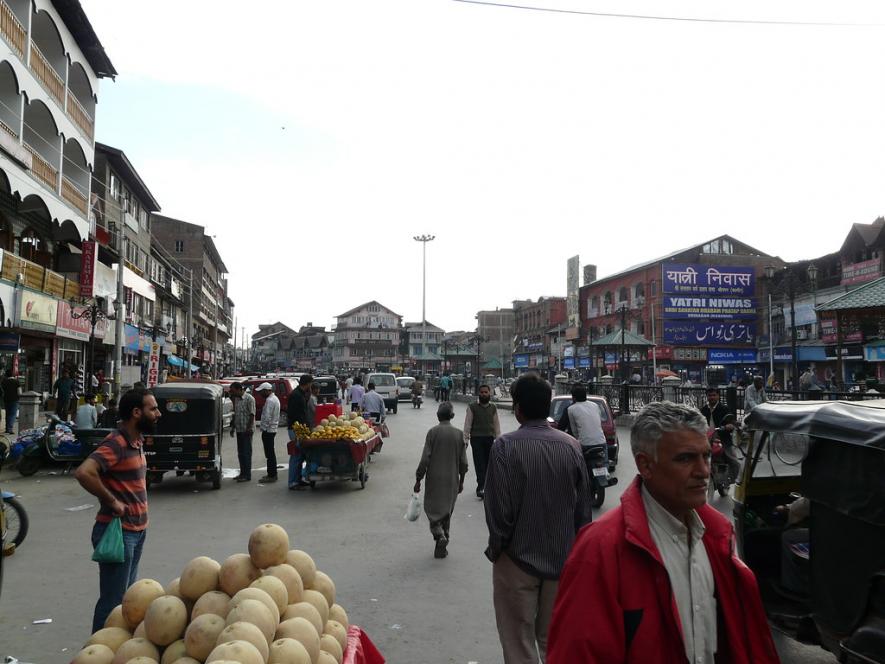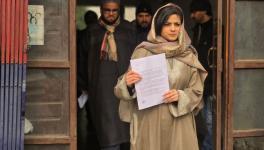‘Bound to Disempower Kashmiris’, say Parties After Delimitation Panel Submits Report

Representational image. | Image courtesy: Flickr
Srinagar: The Delimitation Commission, which was tasked to redraw constituencies in Jammu and Kashmir Union territory, submitted its final draft on Thursday evoking sharp criticism amongst the regional political parties, including the former allies of the ruling Bhartiya Janata Party (BJP).
The Delimitation Commission, which is headed by a retired Supreme Court judge Justice Ranjana Prakash Desai, met on Thursday to finalise the Delimitation Order for the J&K UT following which the Gazette notification was also published.
According to the final Delimitation Order, out of the 90 Assembly Constituencies in the region, 43 will be part of Jammu region and 47 for Kashmir region keeping in view the provisions of Section 9 (1) (a) of the Delimitation Act, 2002 and Section 60(2)(b) of Jammu & Kashmir Reorganization Act, 2019.
The delimitation panel published the report after consulting associate members, representatives of political parties, citizens, civil society groups and reserved nine Assembly constituencies for Schedule Tribes, out of which six are in Jammu region and three are in the Kashmir valley.
Following the reorganisation, each parliamentary constituency will now have equal number of 18 Assembly Constituencies each and the names of some of these constituencies have been changed, according to an official statement, keeping in view the “demand of local representatives.”
The delimitation of Assembly Constituencies in the erstwhile State of Jammu and Kashmir was governed by the Constitution of the State of Jammu and Kashmir and Jammu and Kashmir Representation of People Act 1957. The Assembly seats in the erstwhile state of Jammu and Kashmir were last delimited in 1995 based on 1981 Census.
The Delimitation Commission was constituted in March 2020 to redraw constituencies following the abrogation of Article 370 and 35 A and subsequent downsizing of J&K into two union territories.
Aimed at Altering Demography, Say Political Parties
The recommendations of the commission have been rejected by regional political parties who alleged that the exercise was aimed to “disempower” the people of Jammu and Kashmir.
The panel organised public sittings in the capital cities of Jammu and Srinagar on April 4 and 5 respectively following which the commission conducted a final round of internal meetings to examine all the suggestions and took decision on the changes to be made in the draft proposals.
The Delimitation Commission also made recommendations to the Central government which includes provision of at least two members -- one of them must be a female – from the community of Kashmiri Migrants in the Legislative Assembly and such members may be given power at par with the power of nominated members, of the Legislative Assembly of Union Territory of Puducherry.
“The Central Government may consider giving the Displaced Persons from Pakistan occupied Jammu and Kashmir some representation in the Jammu and Kashmir Legislative Assembly, by way of nomination of representatives of the Displaced Persons from Pakistan Occupied Jammu and Kashmir,” the panel said.
M Y Tarigami of the CPI (M), who is also the spokesperson of People’s Alliance for Gupkar Declaration (PAGD), told NewsClick that the delimitation exercise is bound to alter the electoral demography of the region in the long run.
“The Delimitation Commission has submitted its final report despite constitutional freeze on the increase or decrease of Parliamentary or Assembly seats. Though the Delimitation Commission was constituted under the Delimitation Act of 2002 but has re-drawn the constituencies of UT of JK in accordance with the previsions of J&K Re-organisation Act 2019 which has been challenged in the Supreme Court,” Tarigami said.
He added that re-organisation Act modified the law of enfranchisement of J&K as the voting rights for the State Assembly which were restricted to only permanent residents have been extended to non-state subjects also.
“The exercise is bound to disempower the people of Jammu and Kashmir in the long run,” he added.
Sajad Lone-led Jammu and Kashmir People’s Conference (JKPC) said that Kashmir has been discriminated against as in the past with no change, however, with a greater degree of disempowerment.
Lone, however, lashed out at regional political opponents alleging them of being complicit in the exercise that he said is part of the “systematic disempowerment of Kashmiris since 1947”.
“Over the last six decades, Kashmir’s share of assembly seats in the J&K assembly increased from 43 to 47 while Jammu’s share rose from 30 to 43. Who is responsible for systematic disempowerment of Kashmiris from 1947? Those who aided and abetted in the journey from Jammu’s 30 to 37 are the ones who aided and abetted from 37 to 43,” the PC statement said.
The party spokesperson added that the party will file an RTI and seek the video recordings of the meetings. “To expose how those who started beating their chests outside the meeting halls were bending their back backwards to appease and please the members of the delimitation commission,” the statement read.
Imran Nabi Dar of the National Conference (NC) said that the changes that were expected were not made and the genuine concerns were simply ignored. “We are still studying the constituency specific implications but it seems that the panel has addressed concerns of only those who are seen as the political proxies,” he said.
Apni Party’s Muntazir Mohidin termed the report as “disappointing”.
“The delimitation commission has worked to benefit only two political parties. They have changed historical names of places but what is more disappointing is that our recommendations were sought but none of the genuine suggestions were heeded. It is a divisive report that will stoke regionalism,” Mohidin said.
People’s Democratic Party leader Rouf Bhat said that the panel has lost the confidence of people and sees the exercise as an effort to help BJP to win in the region.
“They have violated law and constitution. BJP wants to rule by force but there is trust deficit and these reports further alienate people. Some people who believed in these processes are also disappointed and it is not good for any country. These reports are being forced upon the people,” he said.
Get the latest reports & analysis with people's perspective on Protests, movements & deep analytical videos, discussions of the current affairs in your Telegram app. Subscribe to NewsClick's Telegram channel & get Real-Time updates on stories, as they get published on our website.
























